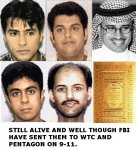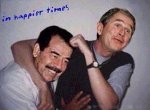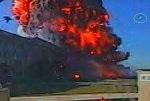robin
Banned
- Joined
- Jun 9, 2005
- Messages
- 1,045
- Reaction score
- 0
- Location
- UK
- Gender
- Male
- Political Leaning
- Slightly Conservative
It is difficult to imagine a more direct rebuke to an American President than the award of the Nobel Peace Prize to Mohammed ElBaradei and the International Atomic Energy Agency.
Joe Conason: 'IAEA's Nobel Prize a rebuff to Bush'
Posted on Wednesday, October 12 @ 10:04:18
Joe Conason, New York Observer
Despite the usual bland denials from all sides, it is difficult to imagine a more direct rebuke to an American President than the award of the Nobel Peace Prize to Mohammed ElBaradei and the International Atomic Energy Agency. Few people have ever prevailed in an important public dispute as thoroughly and decisively as Mr. ElBaradei did in his confrontation with the White House over Iraq's "weapons of mass destruction." (Remember them?)
The deeper meaning of the Nobel committee's decision extends, however, well beyond that celebrated debate--with clear implications for the misconceived and dangerous nuclear policies of the Bush administration. Failing to control the proliferation of nuclear weapons will someday lead to consequences even more dire than the worst hurricane or earthquake. Yet the geniuses now in charge of the world's most powerful government have consistently botched and undermined that effort.
The invasion of Iraq was among the worst blows in recent years to the international campaign against the expansion of nuclear weapons. Back when President Bush, Vice President Cheney and other U.S. officials accused Saddam Hussein of seeking to build a nuclear capability, other nations feared that this charge would merely serve as a pretext for pre-planned aggression.
Those same nations noticed how U.S. officials accepted the most dubious proof of an Iraqi nuclear program, swept aside all contradictory evidence, and precipitated war before the IAEA could complete its intrusive inspections. They also must have noticed that while the U.S. felt free to descend upon Baghdad and oust the feeble Saddam, who turned out to have no such arsenal, the U.S. behaved far more cautiously toward North Korea, which probably does have nuclear bombs and the means to deliver them.
To any government with reason to worry about the intentions of more powerful states, the lesson of this episode is obvious: Build nuclear weapons and the rest of the world will leave you alone. Fail to build nuclear weapons, and you will live at the mercy of those who have them. The corollary was equally plain: Any powerful government--such as China or Russia, for example--can use the suspicion of nuclear proliferation to invade a troublesome neighbor or rival.
By invading Iraq on false pretenses, the Bush administration discarded America's moral credibility and left us unable to argue persuasively against aggressive war and an unchecked arms race.
For trying to save us from that strategic blunder, Mr. ElBaradei deserves the prize and our gratitude. At the time, he learned what happens to those who dare disagree with the Bush administration: The White House--notably the Vice President--and its friends mocked and denounced him and publicly questioned the credibility of his agency. Under this intense pressure, he politely but insistently exposed the fraudulence of the evidence set forth by Messrs. Bush and Cheney.
Many months of fruitless searches of the Iraqi countryside have completely vindicated the Egyptian-born diplomat, of course, but the Bush vendetta didn't end with that protracted farce. The White House demanded further humiliation for our country, and got it.
Earlier this year, Washington expressed its desire to remove Mr. ElBaradei from the job he has done so well. That suggestion received a swift and unanimous rejection from the rest of the world. Now he has not only been reappointed to oversee the IAEA, but also honored for his struggle to maintain its integrity against a mendacious campaign for war.
That war has wasted billions of dollars and thousands of lives, ruined our reputation and damaged our alliances, leaving us more insecure than before. With those squandered billions and alienated allies, we might have done much to protect ourselves--and the world--from terror and proliferation.
If the Bush administration were truly concerned about the spectral "mushroom cloud" that it conjured up to frighten us while planning to attack Iraq, its approach to nuclear issues would have been different from the very beginning.
Rather than rejecting the Comprehensive Test Ban Treaty, as his party did four years ago, the President would have supported its ratification and extension. Rather than undermining the Nuclear Nonproliferation Treaty, as he has done repeatedly by planning and funding new nuclear-weapons programs, the President would have moved forward on his pledge to reduce our arsenal.
Instead of throwing away hundreds of billions of dollars on an enormous missile-defense system that doesn't work, the President could have provided full funding and serious diplomatic attention to our program for securing nuclear weapons and materials in Russia. Instead of diminishing the authority of the IAEA, the President could have treated the agency with the respect it has earned over many years of service.
Perhaps the honor awarded to Mr. ElBaradei will convince the Bush administration that there is no unilateral way to prevent nuclear proliferation. His former adversaries should start listening to him and supporting his work. We can't afford another nuclear mistake.
copyright (c) 2005 the new york observer, L.P.
Reprinted from The New York Observer:
http://www.observer.com/opinions_conason.asp
Joe Conason: 'IAEA's Nobel Prize a rebuff to Bush'
Posted on Wednesday, October 12 @ 10:04:18
Joe Conason, New York Observer
Despite the usual bland denials from all sides, it is difficult to imagine a more direct rebuke to an American President than the award of the Nobel Peace Prize to Mohammed ElBaradei and the International Atomic Energy Agency. Few people have ever prevailed in an important public dispute as thoroughly and decisively as Mr. ElBaradei did in his confrontation with the White House over Iraq's "weapons of mass destruction." (Remember them?)
The deeper meaning of the Nobel committee's decision extends, however, well beyond that celebrated debate--with clear implications for the misconceived and dangerous nuclear policies of the Bush administration. Failing to control the proliferation of nuclear weapons will someday lead to consequences even more dire than the worst hurricane or earthquake. Yet the geniuses now in charge of the world's most powerful government have consistently botched and undermined that effort.
The invasion of Iraq was among the worst blows in recent years to the international campaign against the expansion of nuclear weapons. Back when President Bush, Vice President Cheney and other U.S. officials accused Saddam Hussein of seeking to build a nuclear capability, other nations feared that this charge would merely serve as a pretext for pre-planned aggression.
Those same nations noticed how U.S. officials accepted the most dubious proof of an Iraqi nuclear program, swept aside all contradictory evidence, and precipitated war before the IAEA could complete its intrusive inspections. They also must have noticed that while the U.S. felt free to descend upon Baghdad and oust the feeble Saddam, who turned out to have no such arsenal, the U.S. behaved far more cautiously toward North Korea, which probably does have nuclear bombs and the means to deliver them.
To any government with reason to worry about the intentions of more powerful states, the lesson of this episode is obvious: Build nuclear weapons and the rest of the world will leave you alone. Fail to build nuclear weapons, and you will live at the mercy of those who have them. The corollary was equally plain: Any powerful government--such as China or Russia, for example--can use the suspicion of nuclear proliferation to invade a troublesome neighbor or rival.
By invading Iraq on false pretenses, the Bush administration discarded America's moral credibility and left us unable to argue persuasively against aggressive war and an unchecked arms race.
For trying to save us from that strategic blunder, Mr. ElBaradei deserves the prize and our gratitude. At the time, he learned what happens to those who dare disagree with the Bush administration: The White House--notably the Vice President--and its friends mocked and denounced him and publicly questioned the credibility of his agency. Under this intense pressure, he politely but insistently exposed the fraudulence of the evidence set forth by Messrs. Bush and Cheney.
Many months of fruitless searches of the Iraqi countryside have completely vindicated the Egyptian-born diplomat, of course, but the Bush vendetta didn't end with that protracted farce. The White House demanded further humiliation for our country, and got it.
Earlier this year, Washington expressed its desire to remove Mr. ElBaradei from the job he has done so well. That suggestion received a swift and unanimous rejection from the rest of the world. Now he has not only been reappointed to oversee the IAEA, but also honored for his struggle to maintain its integrity against a mendacious campaign for war.
That war has wasted billions of dollars and thousands of lives, ruined our reputation and damaged our alliances, leaving us more insecure than before. With those squandered billions and alienated allies, we might have done much to protect ourselves--and the world--from terror and proliferation.
If the Bush administration were truly concerned about the spectral "mushroom cloud" that it conjured up to frighten us while planning to attack Iraq, its approach to nuclear issues would have been different from the very beginning.
Rather than rejecting the Comprehensive Test Ban Treaty, as his party did four years ago, the President would have supported its ratification and extension. Rather than undermining the Nuclear Nonproliferation Treaty, as he has done repeatedly by planning and funding new nuclear-weapons programs, the President would have moved forward on his pledge to reduce our arsenal.
Instead of throwing away hundreds of billions of dollars on an enormous missile-defense system that doesn't work, the President could have provided full funding and serious diplomatic attention to our program for securing nuclear weapons and materials in Russia. Instead of diminishing the authority of the IAEA, the President could have treated the agency with the respect it has earned over many years of service.
Perhaps the honor awarded to Mr. ElBaradei will convince the Bush administration that there is no unilateral way to prevent nuclear proliferation. His former adversaries should start listening to him and supporting his work. We can't afford another nuclear mistake.
copyright (c) 2005 the new york observer, L.P.
Reprinted from The New York Observer:
http://www.observer.com/opinions_conason.asp




